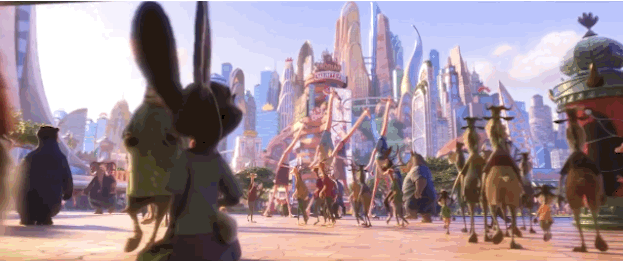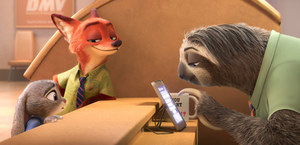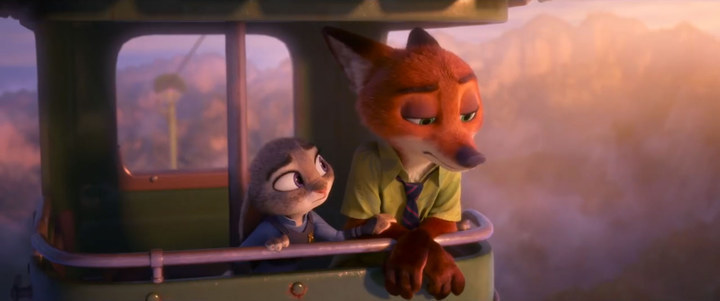You swore you’d never become those kind of people.
BuzzFeed Yellow / Via youtu.be

Nick Wilde (voiced by Jason Bateman) and Judy Hopps (voiced by Ginnifer Goodwin) in Zootopia.
Disney
There’s this scene in Zootopia, the new Disney movie, in which Officer Judy Hopps (Ginnifer Goodwin), a peppy rabbit rookie cop, and Nick Wilde (Jason Bateman), the charming fox and small time con artist she’s recruited to assist her in a missing persons case, are standing over Deputy Mayor Dawn Bellweather’s (Jenny Slate) computer. As Dawn tries to help them track down a lead, Nick becomes entranced by the sheep’s fleecy updo when it’s right at eye level. In an encounter that deliberately evokes one of black hair and the obliviously boundary-free people who feel entitled to help themselves to a feel, Nick reaches out and pats Dawn’s fleece gently, then digs his fingers in it until an outraged Judy scolds him to stop.
“You can’t just touch a sheep’s wool!” she hisses.
Zootopia takes place in a universe populated entirely by highly evolved animals who wear clothes (except for the naturists among them), have jobs, and live together in civilized, not quite perfect harmony. The city of the title is an ingeniously realized metropolis of artificial microclimates (desert, tundra, rainforest) and different-sized streets and services that manages to be visually delightful while leaving unanswered trickier questions, like just what the carnivores eat now that everyone gets along.

Disney
It’s a world in which race does not exist. But species certainly do, and they provide a fuzzier, cuddlier way for Zootopia to get at some thorny issues of prejudice and profiling. On a broad, kid-friendly scale, the movie does this through the developing of Judy and Nick’s cross-species friendship and how they overcome the assumptions placed on them and that they hold for each other — a story about acceptance and the damage caused by prejudgments. But Zootopia is filled with more specific references that signal its aims unmissably to older viewers, from the moment Judy, who becomes the first rabbit to graduate from the police academy courtesy of a “mammal inclusion initiative,” firmly informs someone that “a bunny can call another bunny ‘cute,'” but that it’s really not OK for other animals to do it.
Zootopia, which was directed by Byron Howard and Rich Moore, with Jared Bush co-directing, isn’t the best animated feature Disney’s made. Its main narrative — a city-hopping (LOL) rabbit–fox mystery involving a dozen or so disappearances, organized crime, and a possible conspiracy — feels too heavy for its bright and bouncy tone, like it’s a darker structure that’s been, Roger Rabbit style, shoved into Toontown. Judy and Nick are a deftly created mismatched duo who, poignantly, took opposing lessons from similar, formative childhood experiences with bullying. But the other characters are hit or miss — the sloths working at the DMV allow for a sequence that’s a pean to comic timing, but a mob boss voiced by Maurice LaMarche as a Godfather reference feels cheap, an easy, Shark Tale-level joke wedged into a movie that’s supposed to be better than that.

Disney
But that’s the thing about Zootopia. It’s from the venerable Walt Disney Animation Studios, a brand that’s made a decades-long fetish out of fairy tale and talking animal timelessness, but the issues it wants to tackle stop not all that far short of conversations central to Black Lives Matter. It’s torn between classic animated film instincts and more urgent ones. No one gets killed by a cop in Zootopia, but the city becomes gripped with police-incited paranoia about the predator minority, overcome with suspicion that they really are inherently more dangerous, a population that can’t be trusted and that everyone else needs to be protected from. There’s a scene in which one character instinctively flinches from another, and, for a small moment, it’s a shocking betrayal. Zootopia is a place where anyone can be anything, as Judy idealistically trumpets, except when you’re reminded that everyone’s already assigned you qualities based on what species you were born as.
In times like that, Zootopia feels boldly and almost jarringly ambitious. Take the early instance in which Judy praises Nick for being “articulate,” a word whose loaded sting is met by Nick’s butter-wouldn’t-melt smile. “It’s rare that I find someone so non-patronizing,” he replies with peak-Bateman, get-a-load-of-this-asshole evenness. The movie, to what is (for the most part) its benefit, isn’t one in which the characters or species are meant to correlate to real world groups. Judy, Nick, and the other Zootopia characters might reference things like how the mayor hired someone to secure “the sheep vote,” but they’re channeling aspects of a conversation about race, not standing in directly for parties within it. The voice casting — from Goodwin and Bateman in the main roles to Shakira, Idris Elba, J.K. Simmons, Nate Torrence, Tommy Chong, and Octavia Spencer in supporting ones — seems deliberately chosen to avoid having any one character fall into easy associations.

Disney
Zootopia never tries to be that neat, though there is a point at which its metaphors get a little too messy. When a movie that references relevant topics of racial discussion then flips into a plot about the nefarious triggering of uncontrollable biological instincts in unwilling Zootopian citizens, it’s a briefly uncomfortable turn. Animals have inarguable biological differences that they’ve been able to mostly put behind them in Zootopia, but humans being divided up the same way is the stuff of pseudo-scientific racism, no matter how unintended the parallel.
The movie manages to recover, and becomes a story in which its characters learn, grow, and become better anthropomorphized creatures — you know, as they should in a Disney movie. And though Zootopia doesn’t have the emotional heft of the finest of these animated affairs, it has a gutsiness that’s impressive, awkward beats and all.
For most of the slowly shifting history of Disney animation, straightforward representation has been offered — different cultures, different settings, different princesses. But Zootopia is a movie about representation, and what it means to face expectations that have nothing to do with your actual identity. Talking animals have come a long way.
You win after all!
Are you hella Cali or nah bro?
We plumbed the darkest depths of Tumblr and defeated a basilisk for these.


attackofthepotterhead.tumblr.com


“THIS FAMILY DOESN’T WORK!”
Spoiler alert: grab some tissues.
youtube.com / Via youtube.com

20th Century Fox

20th Century Fox
HUT! HUT! SLAY!
“Creampuff has to poop.”

Elaina Wahl
2. “Get the laser out!”
3. “Have fish the arrived?”
4. “Don’t bring the grumpy cats in here.”

6. “We need the kitten to face the 50-yard line.”
7. “We’re gonna try the other kitty since this one’s, uh, not happenin’.”
8. “OK, laser out, laser out!”
THIS IS NOT A DRILL.
This is a developing story. Check back for updates.

Paul Dano and Daniel Radcliffe in Swiss Army Man.
A24
Dan Kwan and Daniel Scheinert are filmmakers and music video directors. They are not trolls.
That may feel like a strange point to have to make about a duo whose feature film debut not only screened at Sundance in January but also won the directing prize. But that’s what happens when your absurdist buddy movie begins with a suicidal, shipwrecked guy (Paul Dano) riding Daniel Radcliffe’s corpse back to the mainland, courtesy of the dead dude’s flatulence that powers them through the water like a Jet Ski. People start to think that you’re playing some sort of extended prank on the audience, and, as was widely reported, some of them walk out.
But that’s what makes Swiss Army Man one of the festival’s most famous and infamous screenings ever.
Some of the audience members who didn’t leave the theater, however, were moved to cry — because Daniels, as the pair is professionally known, managed to make a gross-out magical realist wilderness saga that deals with themes of loneliness and depression and body shame. In their hands, Manny, which is the name the dead body offers up when it starts talking, turns into a combination life coach/multi-tool/compass/water bottle helping Dano’s Hank survive, journey home, and perhaps overcome the repression that’s been holding him back.
It’s less about fart jokes than it is, as Kwan puts it, about “fart drama.”
The first time Swiss Army Man screened, for what’s traditionally a more staid crowd down in Park City, Utah, a woman rushed the stage afterward to talk to Kwan and Scheinert about what it meant to her. “She was like, ‘I’m not supposed to be on stage right now, I know,'” Scheinert explained. “‘But I just wanted to tell you, I have one friend, and he can fart in front of people. And I have another friend who can’t, and he would be so much happier if he could.'”

Daniel Scheinert and Dan Kwan.
Alison Willmore
During the fest, the filmmakers shared a swank Deer Valley house with Dano, Radcliffe, their co-star Mary Elizabeth Winstead, various other producers, crew members, significant others, and a dummy version of Manny used during filming, his hand revealing the small size of Radcliffe’s extremities. Kwan and Scheinert decided to do this interview in the house’s sauna, initially as a joke: The racquetball court, which the house honest-to-god also contained, had terrible acoustics, and also the sound guy had been camping out in there. But like Swiss Army Man, the concept went from goof to warm, fuzzy feeling quickly, because sitting there in that wood-lined room, fully clothed and flatulence free, was the first time I hadn’t felt cold since arriving in Utah.
Kwan and Scheinert, who are 28 and 27, respectively, met in an animation class at Emerson College, where they discovered they shared first name and sensibility. As Daniels, they’ve made shorts and music videos marked by a playfully anarchic spirit, taking high concepts to some hilariously low places. In their 2014 short “Interesting Ball,” they appeared as themselves in one of several surreal plot strands, with Scheinert offering a sincere testimonial of best friendship while slowly getting sucked inside Kwan’s asshole. In their music video for DJ Snake and Lil Jon’s massive hit “Turn Down for What,” which has over 383 million views on YouTube, standard-issue sensuality gets warped into the preposterous and the grotesque. It’s partying as an infection, with Kwan and a collection of dancers wreaking havoc with body parts that acquire a life of their own.

The music video for “Turn Down for What.”
Columbia Records
So bodies aren’t exactly a new interest. “We wanted to make them gross and celebrate them,” Scheinert said of Swiss Army Man. “Celebrate them for the freedom they unleash, not the sexuality they represent.” Kwan added, “It is fun to intellectualize these stupid things, but I do think it does call to attention the fact that we are just bodies — these weird, physical things that we have no control of, and we are often ashamed of, and our brains are extensions of that.”
Swiss Army Man may have its fart jokes, but it’s sincere in its central question: If you don’t feel free to fart in front of your best friend, even if he’s a dead body who may or may not be a hunger pang delusion, then how are you ever going to be comfortable opening up about anything else? Or, as Scheinert put it, “There’s no heartbreak without the farts.”
The movie’s confounding combination of the wacky and the sincere is one he chalks up to being part of the internet generation. “It’s hard to be affected anymore. It’s hard to make someone laugh and even harder to make someone cry. That’s important for us as filmmakers — to be able to push people into very earnest places,” Scheinert said. “[But] because we’re so self-conscious about being earnest, we have to bury it in something that feels like it undercuts it.”

Radcliffe and Dano in Swiss Army Man.
A24
Kwan and Scheinert can be looked at as successors to David Fincher, Michel Gondry, and Spike Jonze, who established themselves as virtuosic music video mavens before going on to film careers. But, Scheinert pointed out, the types of movies those directors went on to make, the Being John Malkoviches and Eternal Sunshine of the Spotless Minds that were obvious influences on Daniels, “fell by the wayside.”
“I feel like there’s something of a bummer going on in the film industry that has gotten rid of the niche they used to live in, of the late ’90s and early 2000s,” Scheinert said. “Like, Oh, people with crazy ideas can get enough money to go for it.“
Instead, people with crazy ideas go to Sundance, which has been a learning process for Daniels. “The nice thing about shorts is, you come up with a concept, you push it as far as you can go, and then you let it go,” Kwan said. “With this film, we just weren’t allowed to let it go, and it was really frustrating, actually. We’d have to take a step back and be like, ‘This is a mess. OK, let’s figure out what it all means now.'” But, he allowed, “My favorite filmmakers never really know what they’re doing until the end. So that was at least a little bit encouraging.”
And in the meanwhile, they’ve gotten two famous actors to go gleefully outside of their comfort zones in a way that certainly helped the film get picked up by A24 for a planned theatrical release this summer.
But, Scheinert said, “This isn’t just like a celebrity doing a fun indie on the side. This is crazy, for everybody involved.”
So, maybe a little like a prank after all? “I’m slowly realizing we accidentally pranked people twice,” Kwan added. “The first prank was, we made everyone think this was a Sundance drama, starring two actors you love.”
“Then they showed up, and there was so much farting. Now people keep coming, and they’re expecting all these farts,” Scheinert chimed in.
“Instead, they are moved by it,” Kwan said. “They have some sort of emotional or philosophical experience, thinking it’s going to be a fart. To me, that’s the most important prank, right there: people having very low expectations of something, and just being completely blown away.”